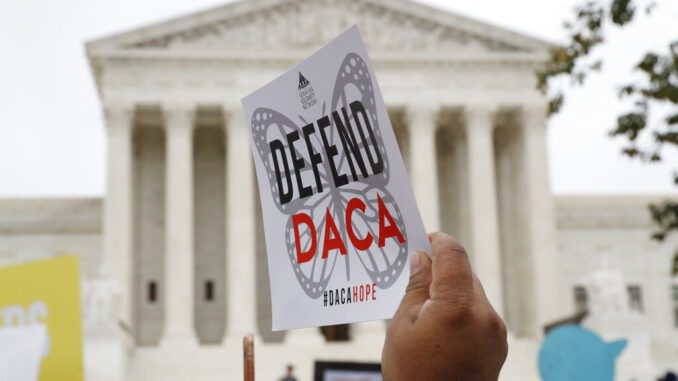
HOUSTON — A federal court next week is expected to consider whether to invalidate a program that shields from deportation immigrants brought to the United States as children.
The challenge scheduled to be heard Dec. 22 in Houston concerns President Barack Obama’s original memorandum creating Deferred Action for Childhood Arrivals, which currently covers about 650,000 people.
Federal courts have already turned away President Donald Trump’s efforts to end DACA. Under the order of a judge in New York, the Trump administration in December restored the program to its original terms under Obama, accepting new applications and full renewals of two-year work permits and general protections from deportation.
But the Houston case directly targets DACA’s original terms, not Trump’s effort to end the program. Texas and eight other states sued to end DACA, arguing it drains state educational and healthcare resources and violates federal law. Leading the lawsuit is Texas Attorney General Ken Paxton, who frequently brings conservative legal challenges, including the case seeking to subvert Trump’s election loss that was dismissed by the U.S. Supreme Court.
Arguing in favor of the program is a coalition of DACA recipients, represented by the Mexican American Legal Defense and Educational Fund. Both sides have requested an order of summary judgment to end the case in their favor. MALDEF argues that Texas and the other states lack standing, the ground on which the Supreme Court dismissed the state’s election challenge.
“This case is an attack on the underlying legality of DACA itself,” said Nina Perales, a lawyer for MALDEF. “This case seeks a ruling that DACA is unlawful that would bind any future administration.”
While DACA is often described as a program for young immigrants, many recipients have lived in the U.S. for a decade or longer after being brought into the country without permission or overstaying visas. Many have become doctors, nurses, and other front-line workers during the pandemic. The liberal Center for American Progress says that roughly 254,000 children have at least one parent relying on DACA. Some recipients are grandparents.
Recipients must pass a background check. The program does not confer legal status.
Opponents of the program argue that Obama illegally circumvented Congress months before his 2012 re-election and that he failed to follow federal procedure in establishing the program.
U.S. District Judge Andrew Hanen will hear the case. Hanen in 2015 invalidated an Obama effort to expand DACA and extend protections to immigrant parents. In the case currently pending, he refused two years ago to issue an injunction against DACA sought by Texas, saying that while he questioned the program’s legality, more harm than good would be done from ending the program.
Hanen is not expected to rule immediately. In 2018, he denied Texas’ request for an injunction three weeks after hearing arguments.
If Hanen were to rule in Texas’ favor, it’s unlikely that people who already have DACA protections would immediately lose them, but an order could close the program to new applications and renewals, Perales said.



